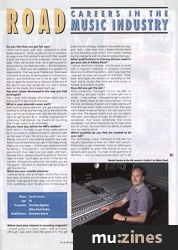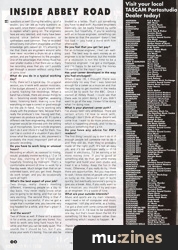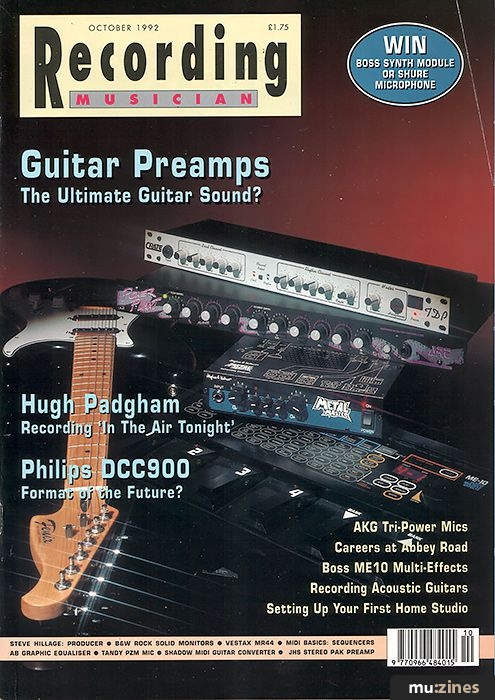Magazine Archive
Home -> Magazines -> Issues -> Articles in this issue -> View
Inside Abbey Road (Part 1) | |
Careers In The Music IndustryArticle from Recording Musician, October 1992 | |
The first in a series exploring careers and opportunities in the audio industry, starting at the world-famous Abbey Road studios.
Many musicians and recording enthusiasts are interested in pursuing a career within the record industry — but where do you start? Derek Johnson begins RM's guide to recording industry careers with the personal experiences of two engineers from the world-famous studio immortalised by the Beatles: Abbey Road.

Ashley Alexander in the live room of Studio 3 at Abbey Road.
Name: Ashley Alexander
Age: 23
Occupation: Assistant Engineer, Abbey Road
Qualifications: Not relevant
Where does your interest in recording originate?
From being in bands at school and buying records — I was interested in how things were put together.
What qualifications or training did you need to get your job at Abbey Road?
When I left school, I had a choice of further education, but a YTS placement came up. I went to Eel Pie, Pete Townsend's studio. I was incredibly lucky, and ended up staying for three years as a fulltime tape op, doing the normal things, making tea, getting onto sessions. It was quite intense, because it was such a state of the art studio — I learned all my MIDI and sampling there, as well as recording piano, drums, backing vocals and guitars.
The YTS course gave me a year in the studio plus day release at college, where I learned about tape editing and theory. There was no maths or physics; if you want to do all that, you obviously want to be a maintenance engineer. I don't need to know.
How did you get the job?
After three years at Eel Pie, Pete closed the place down and just used it for himself. He wrote a letter of reference here, amongst other studios, and they picked me up, which was great.
Which qualities do you feel are needed to do your job?
I didn't realise until six months into the course how lucky I was. In fact, there were 50 of us scattered around studios in London, and it turns out that only a handful stayed in the music business. The others didn't enjoy it, didn't get on, or the opportunities weren't there, which goes to show that just because you're in a studio doesn't mean you're going to make it. There's a studio etiquette, and if you play by the rules, show you are willing and do what you're told, you'll eventually get on.
What do you do in a typical working day?
There's a lot more recording going on here, whereas there was a lot of mixing at Eel Pie. You get all the classical side, the string overdubs and music to picture and programming. I do a lot of assisting, even now. Every now and then you get an engineering break, but it goes from one extreme to another, where you'll be making tea for weeks on end, then recently I assisted on a Henry Mancini session down in Studio Number 1, which was a 100-piece orchestra. It's down to trust, and the producer/engineer just let me get on with it. The next week I was back to making tea.
Do you have to work long or unusual hours?
All hours. Classical sessions are quite safe, because they're in three-hour chunks; at the latest you'll get out of here at about midnight. On pop sessions, however, you'll be starting at 10, and may get home at 3am, five, six, seven days a week. But this is a big place and there are other assistants, so you're not going to be doing that all the time. I've got friends at other studios who are the only assistant, and they do all the work that comes in.
What is the best aspect of your job?
The best thing is getting a result, working on something that's successful. I've worked on stuff that's sold a million in Italy or has been number one in Taiwan. It's quite interesting. Another good thing is that you do get access to down time. This is good on all counts, because if you're not doing much engineering, you get to muck around with the desk and keep up with technology. At the end of the day it's good for the studio, because everyone's getting to use the gear and knows how it works. No one here is really an aspiring artist, but everyone wants to be a producer. I was told to not say I was a musician at my interview, but I think that's stupid because an engineer who can't read a score or doesn't know how a piano works isn't going to be as useful.
And the worst?
Working without a break over a full weekend, and still having to zero the desk and clear up the studio at six o'clock on Monday morning, then taking a cab home during rush hour. That's horrible. That's the worst. I do not like straight to stereo classical sessions, although they teach you to get it right. I hate the sessions where all you do is set up mics, run the tapes and all I do is sit at the back running two 1610s and a DAT, putting in idents, taking notes and that's it. That's boring and monotonous.
Do you feel that you get fair pay?
I think we're quite well paid, compared to other studio assistants. I think people who are in a position to judge know that assistants are worth their weight in gold, but they tend to be underpaid. I don't do too badly. There will be times when we're getting paid for doing nothing, but there are times — like the Mancini sessions — when you are suddenly in a position of responsibility. That was quite frightening: there were a hundred musicians all getting paid for a three-hour session, and everything had to be all right. There was no space for screwing up, because at the end of the day it's you that carries the can and it comes back on the studio. But it evens itself out.
Has your career developed in the way you had envisaged?
Yes; I work with people who know what they're doing and I'm learning all the time.
What is your planned career path?
Even if you're just an assistant, you get a buzz out of working on things and learning, but at the end of the day I want to be involved more, and the only thing for me is to get on and do it, whether engineering or producing. It all interests me, there's not one thing that I'd say I want to do exclusively.
Do you have any advice for RM's readers?
Don't do it — it's really tough. If you really want to do it, you have to understand that it's going to take up five years of your life where you won't see your friends, and you'll start looking anaemic and pale. And it's just as hard once you get in. But keep trying; there is no one route — if there was, everyone would be taking it. Once you're in, just remember to keep your mouth shut, keep your eyes open, and learn, because there's always something going on that you need to know. You'll learn so much in the first six months. And you're a service to the studio; you are the gopher. Get stuck in, and don't get lax or you'll get chucked out.
What are your outside interests?
I write at home, with an 8-track, which is fun. It's so easy here; at home you're limited as to tracks and sounds. I was going to say I play a lot of cricket, but that's something I don't do any more. I'm too busy.

Gareth Cousins at the SSL console in Studio 3 at Abbey Road
Name: Gareth Cousins
Age: 28
Occupation: Recording Engineer, Abbey Road Studios
Qualifications: Electronics Degree
Where does your interest in recording originate?
I played guitar in a band when I was at school, although I was never really that good at it. You get pulled into technology, whatever instrument you play, and I built a little mixer from a Robert Penfold book so that the band could record. From there, I started buying keyboards and my interest spread that way.
What qualifications or training did you need to get your job at Abbey Road?
I did an electronics degree, and became involved with a musicians' collective at university. I'd never done any multitracking before, and it was here that I learned the basic techniques on a 4-track. Those basic techniques are relevant to recording on 64-track digital, except that there are more knobs to twiddle and buttons to press.
How did you get the job?
After university, I thought I'd join the BBC or something, because I knew I'd never get into a studio... I was wrong. I managed to get a month's trial at Abbey Road as technical engineer. During the trial, somebody dropped out of tape opping and since this was what I really wanted to do, they gave me a chance. It was just being in the right place at the right time. The degree helped a lot, but my original interview came about through an introduction — somebody that knew somebody that knew somebody. Just about everybody has to have some sort of contact, because there are plenty of people who are well-qualified.
Which qualities do you feel are needed to do your job?
The technology is very important to the job, but equally important is how you deal with people. Enthusiasm is also important; if you're enthusiastic you'll probably be given the chance to work on sessions quite quickly. You have to ask questions all the time — and you have to know when not to ask questions as well! During the setting up of a session, you can ask as many questions as you want, since there's usually enough time to explain what's going on. The engineers here are very talented, and many have been around since before computers or synthesisers were common. They've recorded almost every instrument imaginable and that knowledge gets passed on. It's amazing to me that there are engineers around who have never recorded a drum kit or a string section, and are frightened by the prospect. One of the advantages that Abbey Road has over smaller studios is that there are so many live recording areas that you can't possibly get through a session without using them at some time!
What do you do in a typical working day?
Firstly, there isn't a typical day. On a typical session, you'd work with session musicians, if the budget allowed it, or you'd work with a band, tracking live recordings. When a band has a break, there are always things to do — bouncing vocals together, assessing takes, listening back, making sure that everything on tape is correct or good enough for the job in hand. You're working very closely with the producer here, because that's really the producer's role. Having said that, engineers do produce quite a lot. It's quite a different role from engineering. Almost every engineer would be involved with the setting up of microphones. Some outside engineers don't do it and I think it's bad for them. You can't be in control of a situation if you don't know what the situation is. Mic placement is probably the most important part of an acoustic recording.
Do you have to work long or unusual hours?
Recording an album, as opposed to mixing, would probably involve working a 12 or 14 hour day, starting at 10 o'clock and hopefully finishing by midnight. That's a comfortable amount of time to work for a five-day week. Much longer than that on an extended basis, and you get tired. People do work longer, and you do occasionally work all night.
What's the best aspect of your job?
Two things, really: there's meeting different, interesting people on a day to day basis. You never really know what you're going to be doing, and that can be very exciting. The second thing is that if something is successful, if you've got a single that's number one, you become very big-headed for a while, and that's great! It is fun!
And the worst?
Two of those as well. If there isn't a session in for a while, you can get very bored. You tend to work very long hard hours for a while and then you can be really quiet. This sounds like it should be fun, but if you enjoy your work it's boring. You can also be treated as a lackey. That's just something you have to deal with. Assistant engineers especially can be badly treated by some people, but hopefully, if you're working with an in-house engineer, something can be done so that the assistant doesn't feel too bad — you have a word with him afterwards.
Do you feel that you get fair pay?
For an in-house engineer, I feel I am well-paid. The best way to earn money as an engineer is to be freelance, but the middle of a recession is not the time to be a freelance engineer. I've got a mortgage, and I'm happy to be earning the money I'm earning for the input I give.
Has your career developed in the way you had envisaged?
When I was 18, I thought there was absolutely no way that I was talented enough for a career as a musician and that the only way to get involved in the media would be to work for the BBC. Once I started at Abbey Road, I could see that there was no point doing it if you didn't want to go all the way. I knew I'd be doing what I'm doing now.
What is your planned career path?
I've always been very ambitious. There are certain artists I'd love to work with, although I don't think all those dreams will come true. I want to do more production, which is happening already, and I'd like to produce something that's a hit.
Do you have any advice for RM's readers?
The first thing I would say is don't do it! If enough people tell someone not to do it and they still do, then they're probably made of the right stuff. It's not an easy job, and it's not well-paid really — if I'd stayed in electronics, I'd be earning a lot more money now. If you're good at something else, do that, get some money together and build your own studio and treat it as a hobby. Keep the fun in the music. Otherwise, if you really do try, I think there are opportunities. But you may have to wait. I know stories of people who aren't as lucky as me, because I got in quite quickly, but eventually someone's going to give you a break. Also, if you really want to be a musician, you shouldn't try and train as an engineer. It's a waste of time.
What are your outside interests?
Music and sports are my main interests, and I read a lot of computer and music magazines. I still play and write, as a hobby; I've got a shed with some computer-based equipment in it. I'd love to be published one day, but that's lower down the list, it's something I'd like to happen rather than something which I expect to happen.
Thanks to Colette Barber and Kathy Varley at Abbey Road for their help in making these interviews possible.
Series - "Inside Abbey Road"
Read the next part in this series:
Classical Sound Engineering (Part 2)
(RM Nov 92)
All parts in this series:
Part 1 (Viewing) | Part 2
More on: Abbey Road Studios
60 Years Of Abbey Road EMI Studios - Abbey Road Studio Of The Month - Abbey Road Studios Willow - The Recording of a Film Soundtrack Music Win A Day At Abbey Road |
More with this topic
The World About Us - Real World (Part 1) |
Studio Of The Month - NOMIS |
The Rockfield Files |
Studio Diary |
Studio Focus - Treetop Avenue Studio, Ipswich |
Battery Studios - The Ever-Ready Studio Complex |
Town House Studio |
Paradise Found - Paradise Studios |
Studio Diary |
Studio Of The Month - Clock Recording Studios |
Alice In Switzerland |
At Home in the Studio |
Browse by Topic:
Recording Studios
Publisher: Recording Musician - SOS Publications Ltd.
The contents of this magazine are re-published here with the kind permission of SOS Publications Ltd.
The current copyright owner/s of this content may differ from the originally published copyright notice.
More details on copyright ownership...
Feature by Derek Johnson
Help Support The Things You Love
mu:zines is the result of thousands of hours of effort, and will require many thousands more going forward to reach our goals of getting all this content online.
If you value this resource, you can support this project - it really helps!
Donations for April 2024
Issues donated this month: 0
New issues that have been donated or scanned for us this month.
Funds donated this month: £7.00
All donations and support are gratefully appreciated - thank you.
Magazines Needed - Can You Help?
Do you have any of these magazine issues?
If so, and you can donate, lend or scan them to help complete our archive, please get in touch via the Contribute page - thanks!
























